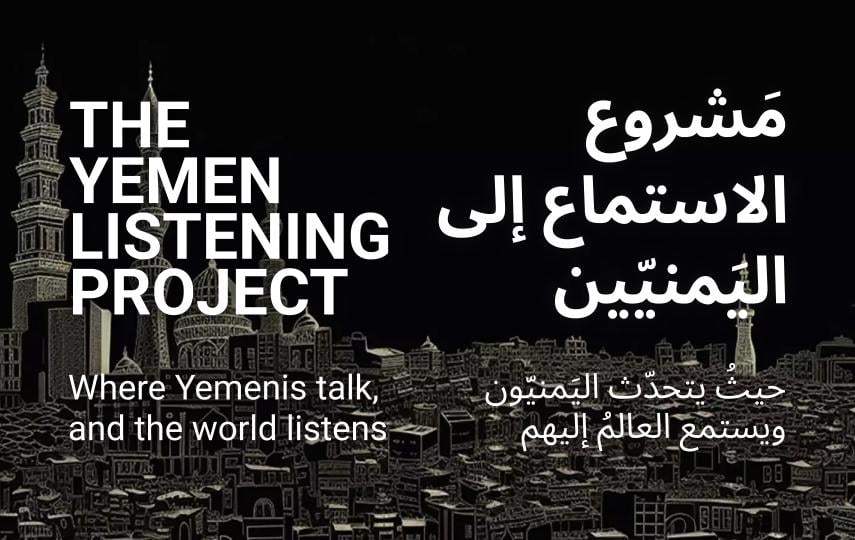This month marks the ninth anniversary of the still ongoing conflict in Yemen. A conflict that has dragged a proud nation – my nation – to its knees. We are heading into a tenth year with devastated infrastructure, a lack of basic services, and very little hope. And still, we rarely hear directly from Yemenis themselves about how the war has personally affected their lives and their communities, and what they want from the future. This must change.
The polarising nature of Yemen’s conflict has been marked by regional interference, corruption, and tribalism. Mix this with narrow self-interest and nepotism, and you get a fractured society that has seen its social fabric ripped to shreds.
When the war began, opportunistic factions on various sides of the war stepped in quickly to fill the vacuum left by the fall of the government and the state as we knew it.
As these groups spread out and created spheres of influence across the country, the voices of the vast majority of Yemenis were drowned out by armed, political, and even social and cultural violence.
There was little room left for the average Yemeni to express their opinions or their needs, and we know that the needs are vast: The UN estimates that more than 80% of the population now needs some form of aid.
Close to 400,000 people have died. More than 4 million are displaced. Millions more traumatised. But we rarely hear about this from Yemenis.
In a recent consultation by the European Institute of Peace of close to 16,000 people across Yemen, we found that more than three-quarters of people said they did not feel their needs were being effectively expressed or represented in discussions about so many things that impact their lives, from peace talks to local priorities like the provision of basic services, economic opportunities and livelihoods, addressing environmental issues, and negotiations about prisoner exchanges.
The consultations also found that the types of grievances people have, and the visions they have for changing things, are far more diverse than anything that is being discussed in various talks about ending the war
There was an undeniable chasm between the political elite and average Yemeni Joes and Janes (Ahmeds and Arwas).
Community participation in peace
That’s why people who live in Yemen increasingly feel that their hardships and concerns are not part of what the international community wants for their country, and that official paths towards peace seem somewhat removed from the realities on the ground.
The conflict has impacted every aspect of life in Yemen, and issues like security and economics are deeply related. But those talking about peace appear to be unaware of these local dynamics and existing historical and cultural baggage that could complicate the most logical and sincere efforts.
The good news is that journalism like The Yemen Listening Project, which actually asked Yemenis how the war has impacted their lives, offers a platform for Yemeni voices.
And the Pathways for Reconciliation Platform, an independent national initiative supported by the European Institute of Peace and launched last year, offers an avenue for ordinary Yemenis to articulate their opinions, exercise influence, and chart routes towards attaining what they need. Designed to amplify Yemeni voices on reconciliation and peace, it encourages them to discuss issues that matter to them on the local and national level, and advocates for their resolution.
It’s clear that people want to talk. There is ample demand, space, and time for conflict resolution efforts that genuinely engage the broader Yemeni population to secure a sustainable and just peace.
There are viable and more effective ways than just giving one or two representatives of civil society a “seat at the table” to ensure that the views of Yemenis are heard, and meaningfully represented.
We should not forget the potential of local communities, where it is worth investing in dialogues that could open a path to reconciliation.This is a key path towards strengthening Yemen’s damaged social fabric.
Where to start? Reach out and listen to Yemenis to get a better understanding of what they have been through over the past nine years. Help them articulate their priorities, and find out what they want if there is peace.
Because there is a pressing need for a clear way to channel the absent voices of Yemenis to decision-makers in their country, and to the international community. True inclusion and buy-in via meaningful participation is the only way we can help redefine the peace process that makes it comprehensive, holistic, and realistic.
By bridging the knowledge gap between people on the ground and those at the top, we can improve the chances that any future peace deal will actually succeed. And that, at the end of the day, is what Yemenis really want.






